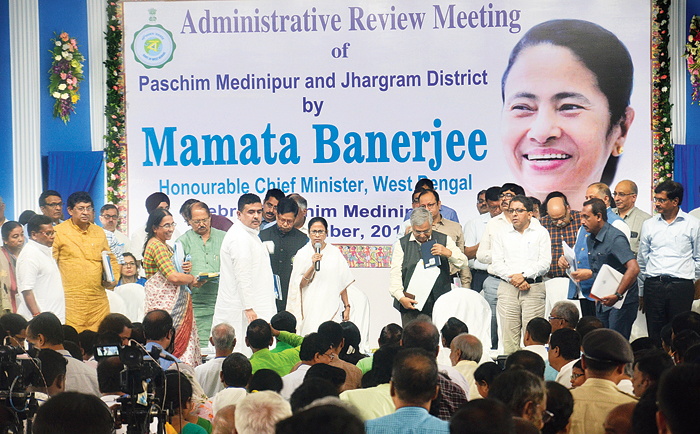Mamata Banerjee sprang a surprise on officers and elected representatives of West Midnapore and Jhargram on Wednesday as she reached the venue of an administrative meeting armed with complaints that ordinary people had lodged either using the Didi Ke Bolo route or with the chief minister’s grievance cell.
“This is not going to be a routine meeting. I will conduct the meeting in a slightly different manner,” said the chief minister in her opening remarks at a community hall in West Mindapore’s Debra, around 110km from Calcutta.
Around 500 officers and elected representatives had gathered at the newly constructed hall for the meeting of the two most backward districts in the state. Even before they could figure out what change she was to introduce in the format — after holding more than 300 such meetings — she gave a sneak peak into what she meant and said: “I have received 706 complaints of lack of road maintenance from West Midnapore. What is the PWD doing?”
The discomfort index in the hall rose as she started reeling off the complaints she had received over the last few months about the performance of police, panchayat, fisheries, backward class welfare, health, and land and land reforms department.
After giving an account of the number of complaints, she highlighted some and asked why ordinary people should suffer because of “inaction by officers”.
A source close to the chief minister said that from now on, this would be the format of administrative meetings. The chief minister will put out reports on the performance of departments instead of
seeking dossiers from the district administrations on what they have done. In meetings prior to the one held on Wednesday, the district authorities used to present detailed reports — including charts and graphs — on their achievements.
Sources said that with the introduction of the new format, those reports would become redundant as the chief minister would come armed with what needs to be done. On Wednesday, for instance, she handed over a list of 239 genuine claimants of welfare pension scheme of the state government to the district magistrate of West Midnapore.
“The chief minister is getting live feedback from the grievance cell at her office and the Didi Ke Bolo team… Then, she is getting the complaints verified and finally drawing up a dossier on genuine complaints. She wants to nudge the administration into action,” said a source.
Although no one close to the chief minister wanted to explain the reasons that prompted her to change the format of the administrative meetings — which she had described as the driving force of her model of governance — her statements during the meeting indicated that the complaints had convinced her that the poor delivery of services at the grassroots was the main reason behind her party’s poor show in the Lok Sabha polls.
“We have to deal with the public on daily basis… If there is any delay or deficiency in delivery of services, people get angry and we face the brunt,” she said.
The ruling Trinamul lost two of the three Lok Sabha seats in Jhargram and West Midnapore in the polls, though the party had in the past few years wielded complete control on the panchayats and civic bodies through which government services are rolled out.
Before the meeting on Wednesday, the chief minister held a brief closed-door session with Trinamul elected representatives, telling them firmly that she would not allow any factionalism and urging all them to work together.
“She is aware that infighting also cost the party dear and she sent out a tough message,” said a source.











